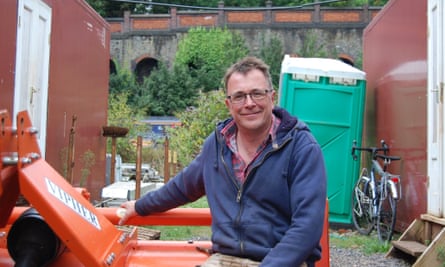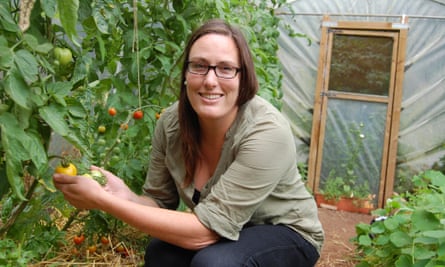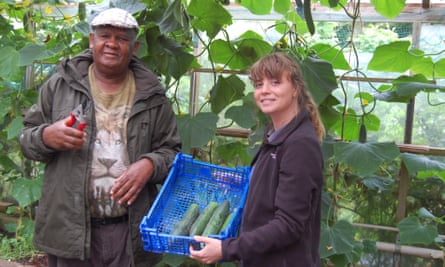Steve Glover doesn’t mind being called an unlikely pioneer of sustainable urban agriculture. A few years ago he didn’t even know how to grow organic vegetables, let alone on a deserted piece of land next to Bristol’s train station.
Today, Glover is supplying high-end local restaurants with vegetables and salads from his farm, the Severn Project. Among his staff, those that grow and pick the produce are recovering drug addicts.
“I love seeing people change from scapegoat to income provider”, explains Glover, himself a former drug addict. “It’s very hard for people to step out of the scapegoat role if they don’t have a role to step into.” Glover has identified a key weakness in modern drug addiction treatment. For all its sophistication, it leaves former addicts in a professional vacuum. Where are people with a 10-year-gap on their CVs going to find work?
So Glover trains them as organic farmers during their drug rehabilitation programme, giving them work at the end of the process. “In the past, our growers would walk through town identifying themselves as drug addicts”, he notes. “Now they walk down the street saying, ‘I supply this restaurant; I supply that restaurant’.”

As contractors, they’re in charge of their own schedules, so some earn £500 per week on their lettuce, tomatoes, cucumbers and herbs, while others earn £150. In total, the Severn Project started with a £2,500 grant and now has annual revenues of £115,000. Glover has plans to triple its production to 1.5 tonnes per week and hire eight apprentices.
The Severn Project is sustainable environmentally, providing organic produce to local customers, but also socially, employing people who might otherwise be dependent on society for their livelihood.
Across town, other people facing challenges in life are harvesting cucumbers at St Werburghs City Farm. Some 60 adults, including those with learning and physical disabilities and victims of bullying, assist nine full-time staff at this organic farm, growing fruit and produce ranging from plums to heirloom tomatoes. Nationwide, urban farms provide work for 2,500 adults with learning disabilities.
Tucked away in a residential area, St Werburghs keeps goats, ducks and pigs, resulting in the somewhat unorthodox sight of sows drinking from a trough behind a row of townhouses. “We’re not just a petting farm; we’re a real working farm”, notes Kari Lucas, the farm’s director. “And the volunteers have a sense of pride in it. It’s their community and their work.”


St Werburghs’ produce and meat – the animals are slaughtered just outside Bristol – are sold at the farm’s café, at surprisingly low prices. Its horticultural training manager, Jess Clynewood, prices the farm’s products lower than Tesco’s organic equivalent to make them accessible not just to the wealthy. “We can’t compete with supermarkets when it comes to range and availability”, says Lucas. “We don’t have peas year-round. But we can always provide customers with a fruit or vegetable, even if it’s not the one they came for.”
Bristol has many other city farms, including Sims Hill Shared Harvest, a farming cooperative, the Community Farm, a member-run organic farm just outside the city, and the new Feed Bristol farm, where both volunteers and schoolchildren help grow fruit and vegetables and take it home with them. Its urban agriculture helped the city win the EU Green Capital 2015 title. “We’re like so many cities in Europe: not a capital, not extremely big, not located by the water”, explains Savita Custead, Bristol European Green Capital’s head of education and engagement. “We see the award as an opportunity to be a role model to other cities that are like us.”
As Green Capital, Bristol won’t just focus on urban agriculture. Its key areas are energy, transport, resources, nature and food but it’s easy to see why its sustainable urban farm culture might catch on elsewhere. For one, the farms require little space. St Werburghs’s land measures 1.8 acres (78,408 square feet) and the Severn Project even less. “Small farms are more productive than large ones because they make the most of their space”, argues Clynewood. “This is the way forward, but it requires a paradigm shift.”
Among consumers, that paradigm shift seems to be underway, with interest in locally grown produce growing along with community gardening projects. What’s needed now, says Lucas, is for retailers to show interest in small farms. “I want to be able to go in and say, ‘here, we have something to sell’’”, she explains. It will be interesting to see if Bristol, at the end of its Green Capital year, has managed to make its local sustainable produce available to a wider range of residents.
This article was amended on 11 September 2014. The Severn Project has annual revenues of £115,000, not £350,000 as previously understood.
Read more like this:
- The asparagus comeback: forgotten seedlings found on Formby golf course
- Food, health and sustainability: we become what we eat, and so does Earth
- Advertisement feature: The importance of sustainable food in Ireland - video
The food hub is funded by The Irish Food Board. All content is editorially independent except for pieces labelled advertisement feature. Find out more here.
Join the community of sustainability professionals and experts. Become a GSB member to get more stories like this direct to your inbox

Comments (…)
Sign in or create your Guardian account to join the discussion